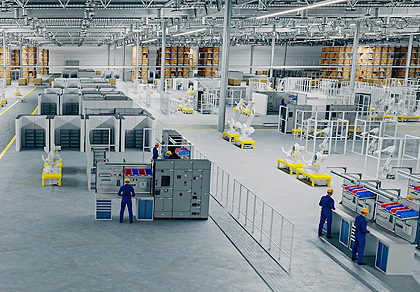[ad_1]
ABB invests $280m in European robotics hub in Sweden

ABB is investing $280m to build a new state-of-the-art ABB Robotics European Campus in Västerås, Sweden, which will serve as a robotics hub for Europe and will boost ABB’s robot production capacity by 50%. The 65,000m2 Campus, will replace an existing facility at the site and will bring together automated manufacturing, R&D, and customer experience and training centres to develop next generation AI-enabled technologies, strengthening ABB’s global leadership in robotics. It is planned to open in late 2026.
The Campus will supply AI-enabled collaborative and industrial robots, as well as digital systems to support flexible automation as part of the company’s “local for local” production strategy.
“The investment in our new Campus is driven by customer demand and projected market growth,” says ABB CEO, Björn Rosengren. “Following important investments in China and the US, the new facility in Sweden will strengthen our capabilities in serving our customers in Europe with locally manufactured products in a growing market. Already today, around 95% of the robots ABB sells in the region are manufactured here. This is a strong commitment not only to our ‘local for local’ strategy, but to all our robotics customers across Europe.”
The facility will expand ABB’s production capacity by 50% and strengthen its capabilities to supply the European market, which is expected to grow with a CAGR of 7% in the period to 2027. When the campus is completed, ABB will have invested $450m in its three robotics facilities since 2018, including its “mega factory” in Shanghai that supplies customers in Asia, and the Auburn Hills facility in the US that supports the Americas.
“This is a great time to invest in robotics and automation,” says Sami Atiya, president of ABB’s Robotics & Discrete Automation business. “This new Campus is a significant part of our global growth story and key in supporting our European customers as they accelerate investment in robotics and AI due to the reshoring of industry, the move to more sustainable supply chains and long-term labour shortages.
“Our Robotics Campus will help us to serve our customers more efficiently and support new and existing sectors like automotive, electronics, logistics, healthcare, e-commerce and pharmaceuticals to unlock the full potential of automation.”
The new Campus will allow close collaboration with customers and partners to develop robotics and automation technologies in a safe, functional environment. Customers will be able to test their ideas and experiment with the latest automation innovations on-site. In addition, employees, visitors and students will be able to take part in an open Campus, both during and after office hours.
“Our new, sustainable facility in Sweden will be located at the cradle of ABB Robotics’ global innovation, starting with ABB’s development of the world’s first commercial all-electric robot nearly 50 years ago”, points out ABB Robotics president, Marc Segura. “In our new R&D centre, we are focusing on the development of new digital and AI-enabled technologies, making robots increasingly accessible while lowering the entry barrier for applications in all industries.”

ABB’s new European robotics hub will expand its production capacity by 50%
The 65,000m2 Campus will have a workforce of 1,300 and will include a new factory, offices, an R&D centre, an experience centre, and a training centre for customers and visitors. AMRs (autonomous mobile robots) will be a key component for transporting materials and products between the warehouse, assembly stations and assembly departments.
Construction is due to begin in 2024, and the hub will replace the nine buildings that have grown organically since 1974 and currently constitute ABB’s robotics operations in Sweden.
By building the Campus in Västerås, ABB is consolidating the area as an automation cluster. The hub will provide an opportunity to develop the ecosystem while maintaining short lead times and a smaller carbon footprint.
The campus will be constructed in line with ABB’s 2030 sustainability targets that aim for carbon neutrality within ABB’s operations by reducing greenhouse gas emissions and increasing preservation of resources. This will influence the choice of building materials and construction processes, as well as the use of solar panels on the roof.
ABB: Twitter LinkedIn Facebook
[ad_2]
Source link
